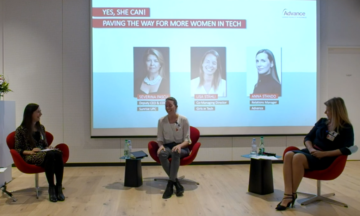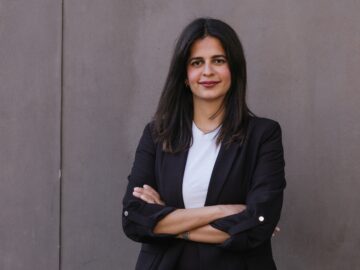Allies Who Inspire Us
We believe the tech industry is not only lacking female role models, but also allies who are outspoken about driving efforts around diversity. Therefore we will occassionally feature an ally who is an inspiring advocate for diversity in tech and can serve as a role model for other allies – or for those who want to become allies.
The Allies Who Inspire Us series continues with introducing Rainer Baumann who is a Group COO at Migros, responsible for IT, Digital Business, Analytics, Engineering and Supply Chain and an Executive at digital switzerland. Rainer’s goal is for more women to join the operations departement at Migros and he is an ally who is not shy to speak up about this topic. Learn about his career path and how Rainer has become interested in the topic of women in tech – also through imminent problems like the skills shortage in tech.
Tell us about where you’re from – geography, studies or professional background, industry, and how you made it to your current role.
My tech career started at the age of 14 when I founded my own business managing the IT infrastructure of primary schools. Within a short amount of time, I was supporting 20 schools, but soon they were managed by a public service, and I had to switch my focus onto small high-end companies such as doctors, architects, and lawyers.
I studied computer science at ETH Zurich and did a PhD in Information Technology. My first job out of university was at a small Swiss company where the possibilities to grow were rather limited. So, I decided to try to live my dream and I applied to be an astronaut. I made it very far in the process, but I am not in space right now, so that did not work out as planned.
After that, I went to McKinsey, and this was the perfect place for me to grow. I was a partner for large tech transformations, and I was working a lot. At some point, my spouse told me that if I wanted to have a life with her, I needed to stop this lifestyle. That’s when I joined Swiss Re. 15 days later, we got married, 3 years later we had our daughter, then we bought a house. At Swiss Re, I was first Head of Group IT and then an IT Executive.
In 2019, I switched to Migros as a Group COO where I am responsible for IT, Technology, Data & Analytics, Digital, Engineering, Supply Chain Management, Transport and Logistics. This is also where I am actively working to bring more women into tech positions.
Privately I am in love with two women: my wife & my 7-year-old daughter. My daughter wrote in a friends’ book that she wants to become an engineer one day. Her favorite subject is electricity, and we invest a lot of time together to explore the world. We learn with batteries, we are putting together cables, exploring currency flows. I truly believe you need to start early with tech education.
I felt that working in tech will allow me to advocate for the use of modern technology and the use of data. Beyond that, I am also passionate about outreach and have given public talks about astronomy, both for children and adults, e.g. at the Spanish consulate. I always knew that I wanted to do more of that.
What do you like about working in tech?
In the late 1990ies, I wanted to understand the world and for that you need a background in physics. That’s why at University, I did a minor in particle physics and wrote a thesis on quantum physics. But I quickly found that the core of business are processes, systems, and information technology – not physics. For business, IT used to be completely irrelevant, it was simply a cost factor, a department in the basement. In business, it used to be all about processes.
Software is not just eating up the world, but it is also making most business functions redundant. Most of these functions are becoming IT functions. The people in business are realizing that they need to be good at tech. So, we are now seeing a new fight: business wants to become the new IT functions.
If you want to truly understand technology, it requires a profound study. If you just play around with IT, you will make a lot of mistakes. IT has a short knowledge span. End-user IT knowledge changes very quickly.
But the underlying principles behind it are still the same: how you build a computer has not changed since 1980ies, and how operating systems work has not changed since the 1990ies. If you understand distributed systems, you also understand blockchain.

Women can contribute a different and valuable perspective which helps solving problems and finding solutions.
When was the first time you were exposed to the topic of diversity in tech? What does it mean to you personally?
In 1999, before studying at ETH, I worked for 3 months in an Operations Department at UBS. We were preparing for the year 2000 problem, the switch from 1999 to 2000, which was expected to cause problems in our IT systems built with COBOL.
I remember that me and my colleagues working in Zurich and London were thinking about a tricky problem one day, but we did not find a good solution. We went home and came back the next day to an email from our two female colleagues in Stanford who proposed a different solution. We read it 2-3 times and realized that they were on the right track.
This was an important moment for me to understand the power of diversity. Whether this incident was from a gender perspective or not, a different way to approach problems helps significantly. I realized in this moment, that women can contribute a different and valuable perspective which helps solving problems and finding solutions.
In the early 2000s, we were 200 students studying computer science at ETH Zurich. Only 6 of them were women, but 5 of those are very close friends of mine. I somehow ended up in a group with an equal number of women and men. We always had a lot of fun and even though I was very techie, I never became a stereotypical computer scientist nerd.
When I did my PhD, I supervised 56 master theses: 50 were men, 6 were women. From the 6 women only 1 was Swiss. I learned a lot from all my students – especially the international ones. One of my female students was from Sewastopol, former Ukraine. There, men are expected to do so-called true work which is of value: going to the army, working in a factory with their hands, etc.
Studying computer science, engineering and math does not have the same value. As an engineer you don’t need to be strong. Engineering work is not as highly valued compared to true physical work – but men are also more valuable. Compared to our understanding here in Switzerland it was all upside down.
This made me realize that the perception of engineering as a profession and women in tech is a regional and societal topic.
In Scandinavia, for example, it is perfectly normal that everyone works full time – they don’t really have a concept of part time. And if you are not working at all, you will be asked whether you did not go to school. It is something unseen. While I was at McKinsey, I worked in Scandinavia for some time and there the IT teams were typically 50:50 – 50% men and 50% women – whereas our teams here in Switzerland were lucky to have at least 1 woman.
In the 2010s the awareness about diversity started to raise again and the number of women in tech increased. Companies put diversity more and more on their agenda – and began to see the advantage of diverse teams. Also, the question of the skills shortage and how to find enough capable people, namely women, in tech was discussed more and more.
In tech, we don’t run out of jobs – on the contrary: the number of jobs and the diversity of job profiles are increasing – we are looking for IT experts all the time. Having more women in tech is not a risk, but a chance to fill vacancies and to be successful as a company
I joined digital switzerland because this topic needs more push. At digital switzerland, I am responsible for fostering diversity in tech & digital education. We don’t have enough tech workers today, and objectively the biggest untapped pool of workers are women. And that’s a fact. As a nation, we need to decide whether we want to outsource everything to other countries or if we want to be a leading tech country?
For the latter, we simply need more people in tech. We need to improve the numbers of women in tech proactively because this is where we have the biggest difference compared to other countries. There are three things that need to change if we want to get more women into tech:
First, we need to get rid of the male-dominated image that tech has. Young girls are being turned off by tech and engineering because of the nerd stereotypes. We need to make women like Franziska Reist more visible who can drive billion-dollar transformation programs bridging business and IT while not being a nerd at all.
Second, we must make it clear that you can work in tech without a pure engineering degree. So many subjects have a tech aspect today. If you study languages like English or German at a University, you know how to structure data, how to model language data, you understand processes and might even learn about data engineering.
If you had studied Biology even 20 years ago at ETH Zurich, you had computer science as a mandatory subject in your second year and there you created a website in word, saved it as HTML and opened it in a browser. Today, you are educated to be a data scientist: you understand how to set up and run simulations, analyze, and validate statistical data, etc. You understand so much about tech already. If you study Biology today, you can easily become a software or data engineer.
The third point is about societal structures regarding family and work. We are really lagging there. From my female study friends, half of them are mothers today. One of them did not go back to work, and one returned after a few years but started in a much lower position. We must be more careful to preserve the careers of those that have a family. The most important decision for anybody who wants to have a family is his or her partner and that he or she takes up the same responsibility. We need to talk about that more openly in our society.

Diversity is a chance, not a challenge.
What are concrete actions that you are taking to help increase diversity in tech? What impacts are you seeing from these actions?
Young men who are partners of women working in tech can potentially have the biggest impact when they support them in their careers – especially if they want to shift to a tech career.
For more senior men I recommend educating yourself about the challenge – especially the differences in self-confidence and how people come across.
You must see that we didn’t do a lot for women in the last decades, we are still catching up. And most women around 40 think they are not up to the job, even if it is offered to them and they have the skills and experience. Older women need to be convinced, sometimes even pushed a bit more. Younger women are now showing similar self-confidence like men, so things are changing, and I like that. Diversity is a chance, not a challenge. This change of attitude is a good thing.
Do you have any strong female role models in your life? What did you learn from them?
I learned a lot from my wife. She has so much patience in helping me understand that my intense thinking, my logic, and my drive sometimes go too far. She also helped me figure out my priorities in life. At McKinsey, I was on the way to becoming a successful senior partner, while having no private life. But job and fame are not everything. While men tend to ask me what my position is, women tend to ask whether I am happy with my job or my life.
At UBS, I learned the lesson of diversity of thinking. Women taught me that you don’t need to be the best to get the job done. Meanwhile, I am super happy that I hire women that are better than me. It’s cool to have people around that are better than me and that are working for me. This change of attitude was not easy at the beginning, but now it feels good because you are no longer stuck in stereotypes.

I truly believe that we are in a transformation, that everything we see, and experience is part of a process, and that the future will be bright.
What’s your advice for women in tech or for allies who want to contribute to more equal opportunities for all in tech?
We are on track but not at the finish line yet – everyone can contribute something. For allies, it is important to show support – encourage women in your environment who want to work in tech or have a chance to make a career there. And explain to others that more women in tech is part of the solution of the labor shortage problem.
For women I would advise to be more self-confident, to please stay in tech, and be mindful of whom you get married to and how you build your career.
There are still some men out there who are concerned that more women in tech pose some sort of concern, also when it comes to their job safety.
Women should acknowledge that there can be concerns from men. Show empathy and never dismiss it as an inappropriate topic to discuss. Answer with logical thinking and reasoning. Explain that there are more opportunities for everyone to advance in their career.
Also, women are up to all technology jobs, but now we have only around 10% of women in coding, and 80% in data science – as a next step we should investigate how we can balance the number of women around the different disciplines in tech.
I truly believe that we are in a transformation, that everything we see, and experience is part of a process, and that the future will be bright.
Are there any readings, podcasts, or other resources that you enjoy or recommend?
There is a great introductory podcast produced by SRF about the labor shortage in IT. It’s in German and offers a good high-level overview – especially recommended for those that are new to the topic.
We’d like to thank Rainer for taking the time for this interview and being an advocate for women in tech. We need more allies like you! Thank you Rainer for being an ally who inspires us! 💛
Author: Lisa Staehli






